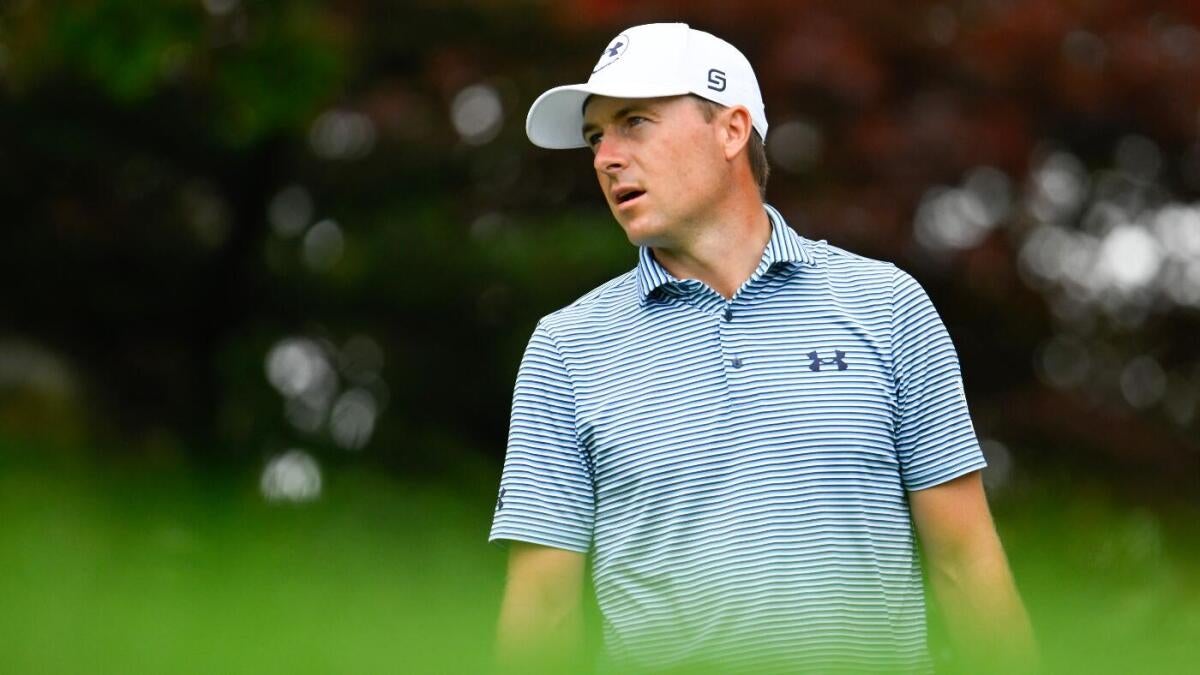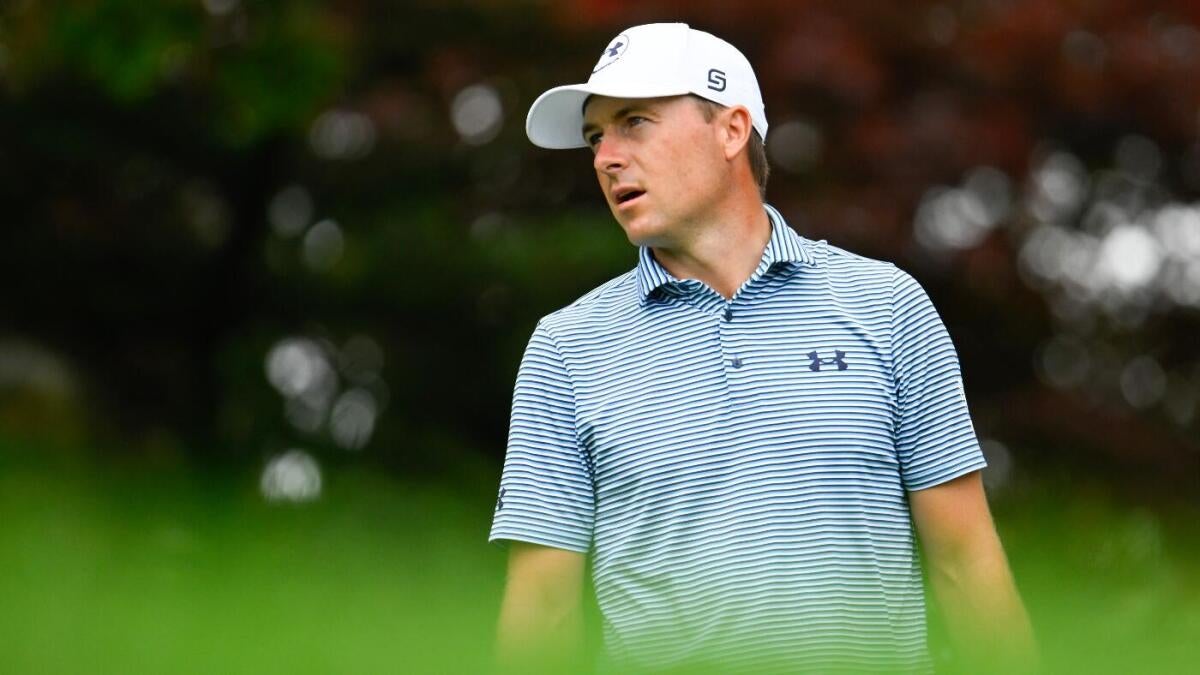A Sudden Halt: Analyzing Jordan Spieth’s Withdrawal from the Travelers Championship
In the realm of professional golf, few events have sparked as much conversation as Jordan Spieth’s unexpected withdrawal from the 2025 Travelers Championship. This moment marked a significant departure from Spieth’s typically steadfast presence on the PGA Tour, raising questions about the nature of his injury, its potential impact on his season, and the broader implications for professional golf. This analysis delves into the intricacies of Spieth’s withdrawal, exploring the factors that led to this unprecedented event and its potential ramifications.
An Impressive Streak Broken
Jordan Spieth’s career is a testament to his dedication and resilience. With 13 victories under his belt, including a win at the Travelers Championship in 2017, Spieth has consistently ranked among the top players globally. His ability to complete every tournament he entered for nearly a decade is a remarkable feat, reflecting his unwavering commitment to the sport. The abrupt end to this streak at TPC River Highlands underscores the severity of his injury and the difficult decision he faced.
The injury, a sudden onset of tightness in his neck and upper back, initially felt during his warm-up on the practice range, rapidly worsened, making it impossible for Spieth to continue. This incident highlights the unpredictable nature of physical ailments in professional sports, where even the slightest discomfort can escalate into a significant issue. Spieth’s attempt to play through the discomfort, captured by Golf Channel cameras, showcased his determination but ultimately led to his concession of the round.
The Nature of the Injury: From Neck to Shoulder
Initial reports attributed Spieth’s withdrawal to a neck and upper back injury. However, further details revealed a more specific issue: tightness in his shoulder blade. Spieth himself suggested that the injury might have been triggered by sleeping in an awkward position, emphasizing the unpredictable nature of such ailments. The pain escalated to the point where he was unable to complete his swing without experiencing significant discomfort. This suddenness is particularly noteworthy, as Spieth had reported feeling “great” during a gym session prior to the tournament.
The injury’s impact on Spieth’s ability to perform is evident. Golf, a sport that demands precision and physical endurance, is particularly susceptible to such issues. The sudden onset of pain and the subsequent withdrawal highlight the fragility of even the most resilient athletes. Spieth’s situation serves as a reminder of the physical demands of professional golf and the importance of preventive care and proper conditioning.
Impact on a Promising Season
The withdrawal comes at a potentially inopportune moment for Spieth. He was enjoying a strong season, with four top-10 finishes already under his belt. The Travelers Championship, a Signature Event, represented a valuable opportunity to further solidify his position among the tour’s elite. While the injury doesn’t necessarily jeopardize his long-term prospects, it undoubtedly disrupts his momentum and raises questions about his preparation for upcoming major championships, particularly The Open.
The timing is especially concerning as players begin to fine-tune their games for the challenges of links golf. The Open, known for its unique conditions and demanding course layouts, requires a high level of physical and mental preparedness. Spieth’s absence from the Travelers Championship may affect his readiness for this major event, adding an extra layer of uncertainty to his season.
A Display of Sportsmanship
Despite the disappointment of being forced to withdraw, Spieth demonstrated commendable sportsmanship. Reports indicate he personally apologized to his playing partner, Luke Clanton, for having to abandon the round. This gesture, while seemingly small, speaks to Spieth’s character and respect for his fellow competitors. It highlights his understanding that golf is not just an individual pursuit but a game built on camaraderie and mutual respect.
Spieth’s apology to Clanton is a testament to his professionalism and his commitment to the sport’s values. In a world where competition can often overshadow sportsmanship, Spieth’s actions serve as a reminder of the importance of respect and consideration for fellow athletes. This incident, though unfortunate, has provided an opportunity for Spieth to showcase his integrity and dedication to the sport.
The Broader Context: Injuries on Tour
Spieth’s situation is not an isolated incident. The demanding physical nature of professional golf, coupled with a grueling travel schedule, often leads to injuries. Jon Rahm’s recent withdrawal from the US Open due to a foot infection and Patrick Cantlay’s history with back injuries serve as stark reminders of the vulnerabilities faced by even the most accomplished athletes. These instances underscore the importance of preventative care, proper conditioning, and the need for players to prioritize their physical well-being.
The physical demands of professional golf are immense. The sport requires a high level of fitness, flexibility, and endurance, all of which can be compromised by injuries. The grueling travel schedule, which often involves long flights and time zone changes, adds an additional layer of stress. Players must be vigilant in maintaining their physical health to avoid such setbacks.
The Significance of the First Withdrawal
The fact that this was Spieth’s first withdrawal in 297 starts isn’t simply a statistical anomaly. It reflects a level of dedication and toughness rarely seen in professional sports. Players withdraw from events for various reasons—illness, personal emergencies, or, as in Spieth’s case, injury. However, the sheer number of consecutive starts completed before this incident speaks to his unwavering commitment to the game and his refusal to give in to discomfort.
Spieth’s streak of consecutive starts is a testament to his professionalism and a defining characteristic of his career. It highlights his ability to push through adversity and his unwavering dedication to the sport. This incident, while unfortunate, serves as a reminder of the physical demands of professional golf and the resilience required to succeed in the sport.
Looking Ahead: Recovery and Return
The immediate focus for Spieth will be on recovery and rehabilitation. The severity of the injury and the timeline for his return remain uncertain. He will undoubtedly work closely with his medical team to determine the best course of action, prioritizing a full recovery over a hasty return to competition. The golfing world will be watching closely, hoping for a swift and complete recovery for one of the sport’s most popular and talented players.
Spieth’s absence will be felt on the tour, and his return will be eagerly anticipated. The incident serves as a poignant reminder of the physical demands of professional golf and the fragility of even the most resilient athletes. As Spieth embarks on his recovery journey, the golfing community will be rooting for his swift return to the course, where his talent and dedication have consistently shone.
Conclusion: A Moment of Reflection
Jordan Spieth’s withdrawal from the 2025 Travelers Championship marks a significant moment in his career and the broader context of professional golf. It serves as a reminder of the physical demands and unpredictable nature of the sport, as well as the resilience and dedication required to succeed. Spieth’s actions, both on and off the course, highlight his commitment to sportsmanship and his unwavering dedication to the game.
As Spieth focuses on his recovery, the golfing world will be watching closely, hoping for a swift and complete return. This incident, while unfortunate, provides an opportunity for reflection on the challenges faced by professional athletes and the importance of prioritizing physical well-being. Spieth’s journey serves as a testament to his character and his enduring legacy in the sport of golf.












